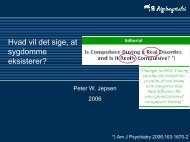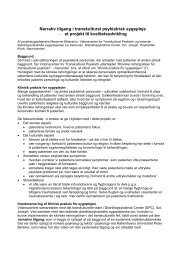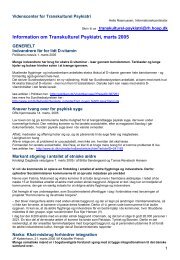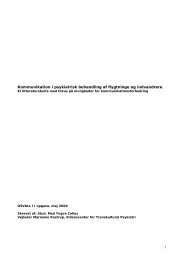Information om Transkulturel Psykiatri, marts 2009 - Videnscenter for ...
Information om Transkulturel Psykiatri, marts 2009 - Videnscenter for ...
Information om Transkulturel Psykiatri, marts 2009 - Videnscenter for ...
Create successful ePaper yourself
Turn your PDF publications into a flip-book with our unique Google optimized e-Paper software.
<strong>Videnscenter</strong> <strong>for</strong> <strong>Transkulturel</strong> <strong>Psykiatri</strong>. <strong>Psykiatri</strong>sk Center København<br />
Helle Rasmussen, <strong>In<strong>for</strong>mation</strong>skoordinator<br />
Practical implications<br />
The present findings suggest BAH psychiatric inpatients with ASPD are at greater risk of alcohol<br />
dependence and drug misuse and report a greater number of unmet needs thus requiring a greater volume<br />
of services; however, current services are not meeting these needs. Mental health teams should ensure<br />
thorough needs assessment procedures are incorporated into general psychiatric service practice ensuring<br />
effective treatment packages are tailored to these patients needs.<br />
Originality/value<br />
The research identifies a previously under-researched sub-group of psychiatric inpatients with a high<br />
proportion of unmet health and social needs and suggests further research to develop service improvements<br />
supporting their management.<br />
Keywords:Antisocial personality disorder, Black African and Caribbean Heritage service users, Mental<br />
illness, Personal needs, Unmet needs<br />
Ethnicity and inequalities in health and social care 4(1), 38 – 48, 2011<br />
Use of Indigenous cultural idi<strong>om</strong>s by Chinese immigrant relatives <strong>for</strong> psychosis :<br />
impacts on stigma and psychoeducational approaches<br />
Yang, Lawrence H.; Singla, Daisy R.<br />
Indigenous interpretations of mental illness might negatively impact treatment adherence. However,<br />
psychiatric "labeling" potentially leads to stigma among Chinese groups, thus encouraging the use of<br />
indigenous idi<strong>om</strong>s. We examined how relatives' use of indigenous labeling varied with the consumers'<br />
experience of illness and whether indigenous labeling protected relatives fr<strong>om</strong> internalized and experienced<br />
<strong>for</strong>ms of stigma. Forty-nine relatives of Chinese-immigrant consumers with psychosis were sampled.<br />
Although consumers had progressed to the middle stages of psychosis, 39% of relatives used indigenous<br />
idi<strong>om</strong>s to label psychosis. Indigenous labeling decreased when illness duration increased and when visual<br />
hallucinations were present. Indigenous labeling further predicted lower internalized stigma among relatives.<br />
Relatives who used indigenous labeling also reported fewer indirect stigma experiences, although not after<br />
controlling <strong>for</strong> illness severity. The frequency of direct discrimination among relatives did not differ by<br />
labeling. These <strong>for</strong>ms of felt stigma might be embedded into relatives' psychoeducation programs to mitigate<br />
adverse consequences of psychiatric labeling.<br />
Keywords: Stigma, explanatory models, indigenous labeling, schizophrenia, Chinese<br />
Journal of Nervous and mental disease 199(11), 872-878, 2011<br />
NYHEDSBREVE<br />
International Psychiatry<br />
The influence of war and terrorism on post-traumatic distress among Israeli<br />
children<br />
Post-traumatic stress disorder and attention-deficit hyperactivity disorder in<br />
Palestinian children affected by the war on Gaza<br />
Being monolingual, bilingual or multilingual: pros and cons in patients with<br />
dementia<br />
Læs nyhedsbrevet her: http://www.rcpsych.ac.uk/pdf/IPv8n4.pdf<br />
ANMELDELSER<br />
Rahul Bhattacharya, Sean Cross, & Dinesh Bhugra (Eds.), Clinical Topics in Cultural<br />
Psychiatry. London: Royal College of Psychiatrists Publications, 2010. 432 pp. £30.00 (pb),<br />
ISBN 9781904671824.<br />
Reviewed by: Suman Fernando, University of Kent and London Metropolitan University, UK The past 30<br />
years has seen major changes in the understanding of ‗‗culture‘‘ in relation to mental health and psychiatric<br />
practice. Prior to the 1960s, cultures as applied to individuals were seen as fairly static ‗‗patterns of belief,<br />
feeling and adaptation which people carry in their minds‘‘ (Leighton & Hughes, 1961, p. 447) – entities that<br />
were inherited and passed on within families. Today they are seen as dynamic systems of knowledge and<br />
practice, sustained by cognitive models, interpersonal interactions and social institutions, that give rise to<br />
11






